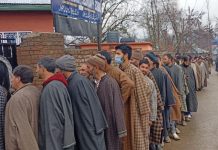
EDITED EXCERPTS FROM AN INTERVIEW
“If we are abandoning Sri Lanka, it’s because Sri Lanka abandoned us first,” Shivan, your protagonist in The Hungry Ghosts, declares dramatically. But you have reconnected more and more with your home country. Did you face the same alienation Shivan did when he returned?
I have been going back to Sri Lanka since 1992 and, in 1997, my partner and I spent a year there. So I haven’t reconnected recently. I’ve kept up with it. However, I did feel the same alienation Shivan felt and I felt it for the longest time. But gradually Sri Lanka, or more to the point, the Colombo circles I move in, has changed. So, it’s really easy for me to be gay in Sri Lanka. Also, sometime back, I gave up on the idea of ever trying to fit in anywhere. It’s such a silly thing, this “fitting” in, and when one gives up that hope, it is so freeing. My Sri Lankan friends also don’t really fit in, in various ways. Now Sri Lanka is almost too familiar and sometimes when I land in Colombo, I find myself nostalgic for that sense of alienation and the excitement it bred, which was fertile ground for a writer. Like Shivan, I would like to look around my landscape as I drive into Colombo and feel that sense of strangeness. But it is such a familiar drive now and often in the car, I am making a mental shopping list in my head of all the things I must get before I get to my apartment.
Do you see Sri Lanka differently now as a member of the Lankan literary establishment, rather than an “émigré writer sniffing around for a story”?
Yes. I see its complexity much more. Working in a place really roots you there. Because I left at 19, despite being much older on various trips back, I was still 19 in some way. But now I really feel, just by having worked there, that I am a really mature adult in that landscape. I have made some of my closest friends during my working life there. Nothing like running a literary festival to bring people together.

Shyam Selvadurai
Penguin India
384 pp; 599
So what is your assessment of post-bellum Sri Lanka? Are you optimistic, now that the LTTE has been defeated?
I am delighted and relieved they were defeated. They were a blight to their country and especially to their own people. However, they have left a power vacuum and also left the Tamil people without a strong voice to represent them. I guess this wouldn’t have mattered so much if the current government made real efforts at bridge-building and reconciliation, but this isn’t happening at all. Then there is the killing of journalists, the silencing of dissent… It feels rather dismal as gradually the great hope the end of the war brought is being drained away.
There has also been a hardening on the part of the Buddhist clergy. Last week’s self-immolation by a monk to protest cattle slaughter and proselytising by minorities is an example. You’ve said you don’t consider yourself a Buddhist as Buddhism “carries all the problems that religion has for (you)” in a Sri Lankan context.
I meant religion in general, not just Buddhism. Well, what can I say? To start with, I’m not a “joiner”, to use a North American term. I don’t like congregating and praying together and particularly don’t like the basement social after with cookies and coffee. Then there is the homophobia, the sexisms, the misogyny, the hatred, the fundamentalism, the ridiculous things one is expected to adhere to because one is of the “faith”, the priests you are expected to venerate and respect even though they are undeserving of it… Need I go on?
Shivan’s grandmother uses Buddhist fables as a justification for her slumlordly actions. Is that a perversion of Buddhism, or an exploitation of the non-prescriptive, nonjudgemental nature of the religion?
Yes, it is a perversion, but one that is very prevalent in Sri Lanka. The rather heartless way she uses karma to justify other people’s suffering and her own good fortune is all too familiar if you are Sri Lankan. It’s also funny and I hope the reader finds it grimly amusing.
What prompted you to rely on the Jataka tales in your novel as an allegorical device? Was it simply that the plot demanded it, or something else?
They are not just Jataka stories but also stories that are set in the Buddha’s lifetime. I fell in love with them when I first read them as they are so simple and yet so complex. Also, as a writer, I was very interested in how a different philosophy created different narrative structures from the Western ones, and I was keen to try and find a way to use those structures in my novels. The structure of The Hungry Ghosts is based on the Naked Perethi story. Part 4 mimics the denouement of the Demoness Kali story, wearing down the protagonist to a moment of wisdom and freedom.
What differences do you see between Arjie from Funny Boy and Shivan here, as the two wrestle with their sexuality in conservative Sri Lanka?
Arjie’s story ends at his moment of realising he is gay. Shivan’s continues on into the trials and pleasures of being gay for someone like him, i.e. non-white, Sri Lankan. Shivan, because of his inner hunger, is blind to the reality around him and this is reflected in how he negotiates his sexuality in Sri Lanka. Arjie is much more clear sighted, even though much younger than Shivan. But in the end, I think Shivan is a more interesting character, as he plumbs the depths of his soul to emerge a new person. He really does descend into the darkness, as we must all do, in order to find wisdom.
ajachi@tehelka.com











